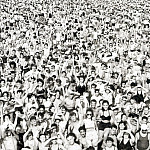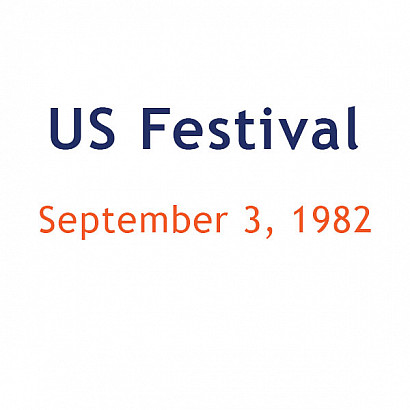3
Featured Events
 1990George Michael releases his second solo album, Listen Without Prejudice Vol. 1. Looking to avoid the pitfalls that overwhelmed him after his debut Faith, Michael refuses to tour in support of the album and won't appear in the music videos.More
1990George Michael releases his second solo album, Listen Without Prejudice Vol. 1. Looking to avoid the pitfalls that overwhelmed him after his debut Faith, Michael refuses to tour in support of the album and won't appear in the music videos.More
1972The Temptations sing, "It was the 3rd of September, that day I'll always remember" in their song "Papa Was A Rollin' Stone."
1968Ringo returns to The Beatles after quitting in frustration during the White Album sessions. He finds his drum kit covered in flowers.
1968Sly & the Family Stone beat out The Chambers Brothers to win Showcase '68, a TV talent show kind of like American Idol but with professional acts.
3
In Music History
2017Steely Dan co-founder and guitarist Walter Becker dies of esophageal cancer at 67.
2013Trisha Yearwood appears on TLC's genealogy documentary series Who Do You Think You Are? The country singer discovers an English ancestor was a criminal before he immigrated to America.
2007Rockabilly singer Janis Martin dies of cancer in Durham, North Carolina, at age 67. Known for her version of the pop/country song "Love Me to Pieces."
2007Gerard Way of My Chemical Romance marries Mindless Self Indulgence bassist Lyn-Z backstage at Linkin Park's Projekt Revolution festival.
2004Songwriter Roquel "Billy" Davis (also known as Tyran Carlo) dies in Detroit, Michigan, at age 72. Co-wrote many R&B/soul hits, including Jackie Wilson's "Lonely Teardrops."
1994R&B singer Major Lance dies of heart disease in Decatur, Georgia, at age 55. Known for the 1963 hit "Um, Um, Um, Um, Um, Um," written by Curtis Mayfield.
1991Ike Turner is released from prison after serving 14 months for cocaine possession.
1991Rush release their 14th studio album, Roll the Bones.
1982Culture Club's "Do You Really Want To Hurt Me?" is released in the UK. The critics are not kind; Smash Hits calls it "fourth division reggae."
1973Pop singer Jennifer Paige is born Jennifer Paige Scoggins in Marietta, Georgia.
1970Canned Heat frontman Alan Wilson commits suicide at age 27 via barbiturate overdose. A litany of other rock artists soon die at the same age, including Jimi Hendrix two weeks later.
1970The Dave Clark Five call it quits after ten years.
1969The 30th Elvis Presley movie, the '20s period piece The Trouble With Girls (And How To Get Into It), is released.
1967A young Swedish singer named Anni-Frid Lyngstad wins a talent-show contest on the TV program Hyland's Corner with her group the Anni-Frid Four. She would later become famous as one of the two female lead singers of ABBA.
1965Lou Christie records "Lightnin' Strikes."
Steve Wozniak's US Festival Features Fleetwood Mac And Lots Of Tech
 1982
1982Apple co-founder Steve Wozniak throws the US Festival "for a few thousand friends" in hopes of uniting people through music and technology. A crowd of at least 200,000 shows up in the blistering heat of San Bernardino, California, for three days of music, tech-geekery, and dust... a whole lot of dust. Fleetwood Mac, performing for the first time in two years, headlines a bill that also includes The Police and the Grateful Dead.
The $12 million US (pronounced "us" rather than "U.S.") Festival launches at Glen Helen Regional Park the Friday of Labor Day weekend with great fanfare. It adopts the general "gathering for cultural unification" theme exemplified by Woodstock 13 years earlier, but is far more civilized, with plenty of food, water, toilets and shelter to go around. It's also not cravenly profit-driven: A cup of beer costs $1.50; Cheeseburgers go for $2.75, while ham and eggs run $4.50. The festival kicks off with England's Gang of Four. They are followed by the Ramones, the The English Beat, Oingo Boingo, Talking Heads, The B-52s, and The Police. The stage is massive and the sound system state of the art. Most of the performers are in the middle of their own tours and in sharp form. Working with the brilliant audio setup, they all put on tremendous shows. Stewart Copeland of the Police sees the B-52s performance as the high water mark for the entire festival, with a truly unforgettable showing. The heat reaches 110 degrees by Saturday as 200,000 people gather and clouds of dust blow over the scene. Air-conditioned tents, beer gardens, and swimming facilities keep people as cool as possible. The heat is still stifling, however, and many surmise that it's the reason that the crowd remains relatively docile. Over the course of the entire weekend, 36 people are arrested, nearly all for minor offenses. Saturday features Dave Edmunds, Eddie Money, Santana, The Cars, Pat Benatar, and Tom Petty & the Heartbreakers. Ray Davies of The Kinks sings "Low Budget." The crowd, trapped in one of the worst recessions in American history, sings back ferociously with the tune about being broke. A world-class laser display is put on between Pat Benatar's and Tom Petty's acts. In addition to the musical acts, there is also a technology fair where computers, video games, and science fiction are displayed. Dozens of arcade games, including Defender, Tempest, Zaxxon, Red Clash, Centipede, and Krazy Kong, are available for play in three tents. The TVRO of United Satellite Systems is revealed with a whopping 50 television channels. Insane predictions are made that it will have more than 150 by 1985. L. Ron Hubbard's novel Battlefield Earth, which will someday be adapted into one of the most universally panned films ever made, is previewed along with a 10-foot-tall replica of Psychlos, one of the novel's characters. Sunday, the final day of the festival, starts with the Grateful Dead, drawing more fans than any other act in the lineup. Jerry Jeff Walker, Hoyt Axton, Jimmy Buffett with the Coral Reefer Band, and Jackson Browne follow the Dead. At the end of Browne's set, someone runs an American flag through the crowd and receives a raucous ovation. Fleetwood Mac, who had been paid the remarkable sum of $500,000 to play, close the show. They put on a snarling, clanging rendition of "The Chain" that erases three days of heat and dust, reinvigorating the exhausted crowd into near lunacy. At the end of the performance, Lindsey Buckingham addresses the audience. "You know, we've been away for a while now. We just came out with a new album but we were away before that for a little bit. A lot of things have happened with us, solo albums and a lot of things, and everyone thought that we weren't around anymore, but we're here to show you that we still are." Buckinham's proud proclamation obscures the very real problems of addiction, bankruptcy, and broken relationships that continue to plague the band behind the scenes. As Buckingham finishes up his statement and the band charges into "Don't Stop," it doesn't really matter. For this one night in San Bernadino, howling through the dusty heat, Fleetwood Mac is immortal. The festival ends after Fleetwood Mac's performance, with nearly everyone involved considering it a smashing success. Wozniak loses money in the endeavor, but it had never been about making a profit for him, anyway. For three days he brought people together with music and technology, which is all he really wanted. A second, larger US Festival is held on Memorial Day weekend, 1983. It, too, is lavishly produced and plays host to several of the biggest bands of the era. After that, no serious attempts are made to revive the festival until 2009, when Wozniak spends another million in planning before deciding to drop the project for good. He determines that he no longer has the money or resources to do another US Festival, but keeps the door open to the possibility that someone else may come along to take up the mantle. Until that time comes, the US Festival - like acid-wash jeans, fanny packs, and 'Til Tuesday - remains a distinctly '80s phenomenon.

No comments:
Post a Comment